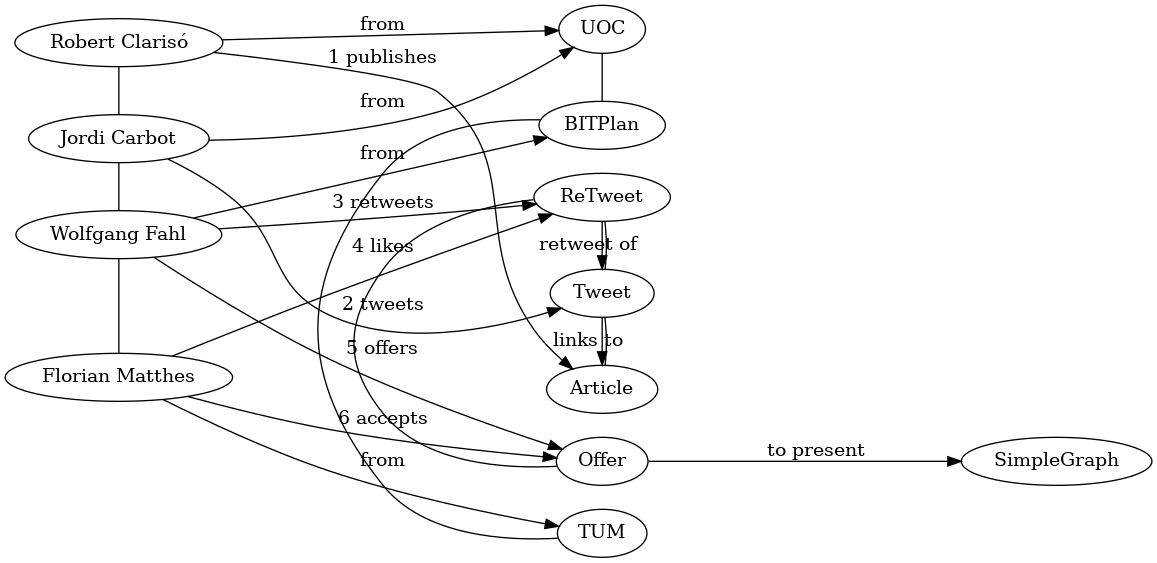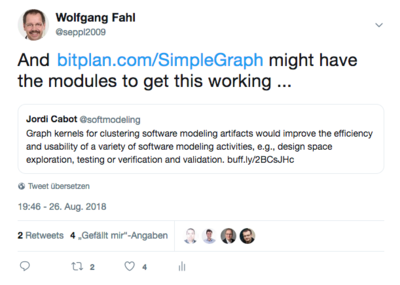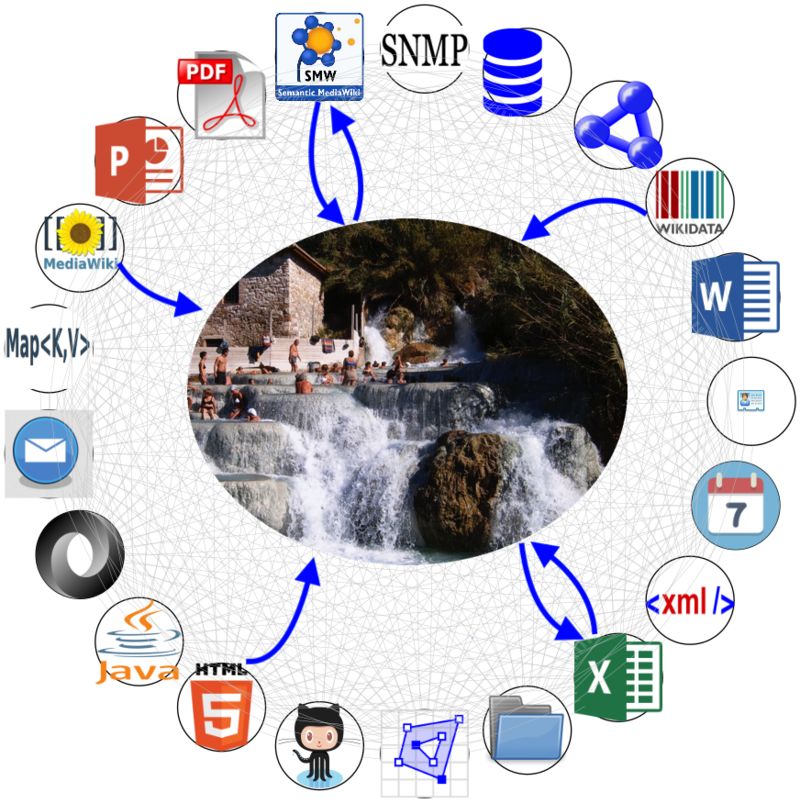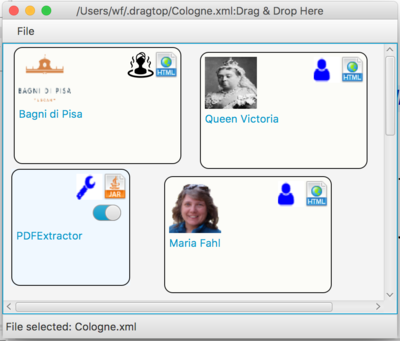Graph Approaches for Software Engineeering: Difference between revisions
No edit summary |
|||
| Line 90: | Line 90: | ||
# Exploit the information in the kernel matrix | # Exploit the information in the kernel matrix | ||
== ⌘⌘ Use SimpleGraph for the 5 Steps == | |||
[[File:toskana2019planning.png|800px|center|link=http://www.bitplan.com/index.php/SimpleGraph#Module_Hub_and_Spoke]] | |||
== ⌘⌘ Step 1: Decide how the model should be encoded into a graph == | |||
Each SimpleGraph Module transforms data from some API to a Graph representation. | |||
The transformation is usually as "straight-forward" or "natural" as possible. | |||
== ⌘⌘ Step 2: Translate each of the models into a labeled graph == | |||
Each SimpleGraph Module uses the following steps to translate from an API to the graph | |||
# connect() | |||
# moveTo() | |||
== ⌘⌘ Step 3: Select the graph kernel algorithm to be used == | |||
SimpleGraph is based on Apache Gremlin/Tinkerpop so all the algorithm and libraries around this graph environment are directly available. If a different graph kernel and or algorithm is needed than the graph can be translated / imported via standard graph import/export formats and or import/export adapters and utilities | |||
== ⌘⌘ Step 4: Load all the graphs and compute the graph kernel ==== | |||
Simplegraph is based on the Hub&Spoke approach. Any combination of modules/API can be applied. | |||
Currently there are some 20 different modules to choose from. | |||
need to install https://www.mediawiki.org/wiki/Extension:Math/de | |||
<math>\begin{align} | |||
5! &= 5 \cdot 4! \\ | |||
6! &= 6 \cdot 5! \\ | |||
50! &= 50 \cdot 49! | |||
\end{align}</math> | |||
== ⌘⌘ Step 5: Exploit the information in the kernel matrix == | |||
There are two modes for exploiting the information: | |||
# OLAP | |||
# OLTP | |||
===⌘⌘ What is Apache TinkerPop/Gremlin? === | ===⌘⌘ What is Apache TinkerPop/Gremlin? === | ||
[[File:Gremlin programming language.png|400px]] | [[File:Gremlin programming language.png|400px]] | ||
| Line 96: | Line 123: | ||
* [https://en.wikipedia.org/wiki/Online_analytical_processing OLAP - Online Analytical Processing - Queries] | * [https://en.wikipedia.org/wiki/Online_analytical_processing OLAP - Online Analytical Processing - Queries] | ||
* [https://www.wikidata.org/wiki/Q79972 - Example - Ancestors of King James] | * [https://www.wikidata.org/wiki/Q79972 - Example - Ancestors of King James] | ||
== ⌘⌘ Outlook: Dragtop == | == ⌘⌘ Outlook: Dragtop == | ||
Revision as of 10:24, 16 February 2019
<slideshow style="bitplan" headingmark="⌘⌘" incmark="…" scaled="true" font="Comic Sans MS, Calibri, cursive" >
- title
Graph Approaches for Software Engineering
- author
- Wolfgang Fahl Wolfgang Fahl info@bitplan.com
- footer
- Applying the OpenSource Project SimpleGraph and it's modules to Software Engineering
- subfooter
- sebis Oberseminar Technische Universität München
</slideshow>
⌘⌘ Wolfgang Fahl
| |
 Peugeot Ion |
 Giant Explore |
⌘⌘ Vorgeschichte
⌘⌘ Why I am here

⌘⌘ Graph Kernels for Model Driven Software Engineering
5 Steps
- Decide how the model should be encoded into a graph
- Translate each of the models into a labeled graph
- Select the graph kernel algorithm to be used
- Load all the graphs and compute the graph kernel
- Exploit the information in the kernel matrix
⌘⌘ Use SimpleGraph for the 5 Steps
⌘⌘ Step 1: Decide how the model should be encoded into a graph
Each SimpleGraph Module transforms data from some API to a Graph representation. The transformation is usually as "straight-forward" or "natural" as possible.
⌘⌘ Step 2: Translate each of the models into a labeled graph
Each SimpleGraph Module uses the following steps to translate from an API to the graph
- connect()
- moveTo()
⌘⌘ Step 3: Select the graph kernel algorithm to be used
SimpleGraph is based on Apache Gremlin/Tinkerpop so all the algorithm and libraries around this graph environment are directly available. If a different graph kernel and or algorithm is needed than the graph can be translated / imported via standard graph import/export formats and or import/export adapters and utilities
⌘⌘ Step 4: Load all the graphs and compute the graph kernel ==
Simplegraph is based on the Hub&Spoke approach. Any combination of modules/API can be applied. Currently there are some 20 different modules to choose from. need to install https://www.mediawiki.org/wiki/Extension:Math/de
<math>\begin{align}
5! &= 5 \cdot 4! \\ 6! &= 6 \cdot 5! \\
50! &= 50 \cdot 49! \end{align}</math>
⌘⌘ Step 5: Exploit the information in the kernel matrix
There are two modes for exploiting the information:
- OLAP
- OLTP
⌘⌘ What is Apache TinkerPop/Gremlin?
 Apache Tinkerpop is an Open Source project.
Apache Tinkerpop is an Open Source project.
- OLTP - Online Transaction Processing - Navigation and Processing
- OLAP - Online Analytical Processing - Queries
- - Example - Ancestors of King James
⌘⌘ Outlook: Dragtop
The Dragtop Open Source Software makes the SimpleGraph modules available for direct access from your Desktop. By simple drag and drop of the input onto the dragtop and then dropping a "tool" onto the dragtop you can combine the module functionality as you see fit.




